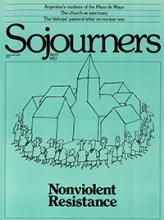The flickering campfire light reflected off the cold barrel of an M-16 Armalite. A guerrilla, in thought, rose, placed a few more pine chips on the fire, and sat down again. Then conversation resumed. Late into the night, a dozen guerrillas and a few visitors were discussing their lives and their visions for the future of the Philippines. In fact, this was the third night of such discussions in this remote mountain redoubt, and the exchange had become fairly honest, sometimes painfully so. It must have been about 2:00 a.m. on that third night when we put the question to them directly: What about your use of violence? How will that affect the revolution you are seeking? Might it be possible to achieve a more just and compassionate Philippine society with nonviolent means?
The response exploded with more force than an M-16: "How strange to hear an American talk to us about nonviolence!"
We First World pacifists have consistently rejected the just war thesis. For similar reasons many equally question the just revolution proposition. While guerrilla groups have fought, to overthrow corrupt and oppressive regimes, as in Nicaragua or El Salvador, pacifists--who generally share an abhorrence for those regimes--have maintained that there must be a better way than armed struggle to bring about genuine liberation.
A pacifist spokesperson in the United States was once quoted as saying: "What evidence is there that the Central American movement has had an in-depth understanding of nonviolence and made a serious attempt to apply nonviolent struggle to the situation facing them?"
Sometimes the question is asked in this way: "Why is it that when people are killed in a nonviolent movement it is said that nonviolence doesn't work, yet when many more people die in guerrilla warfare no one says violence doesn't work?"
Read the Full Article

